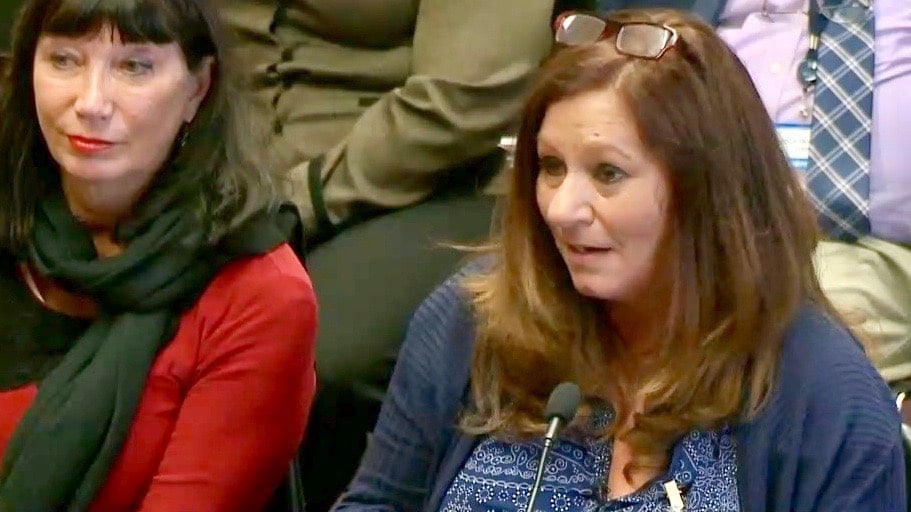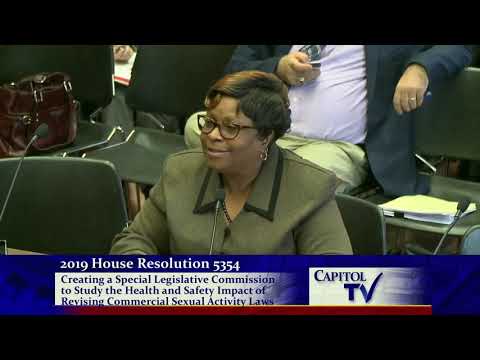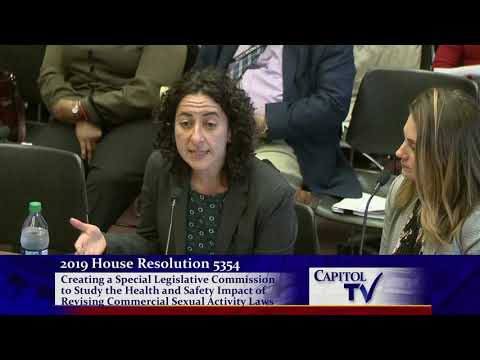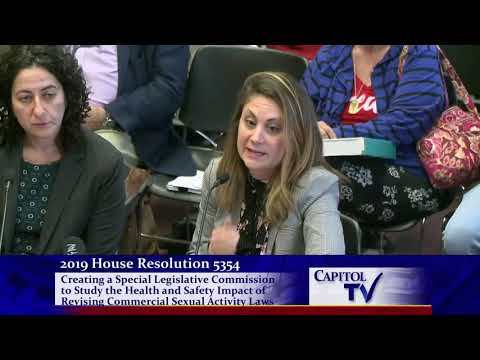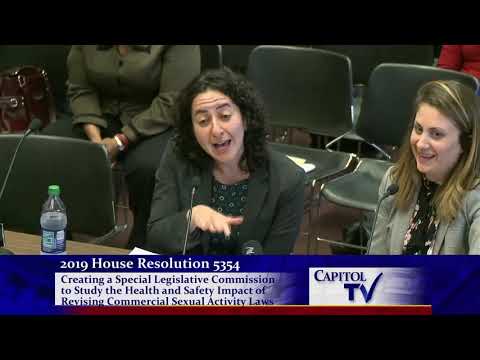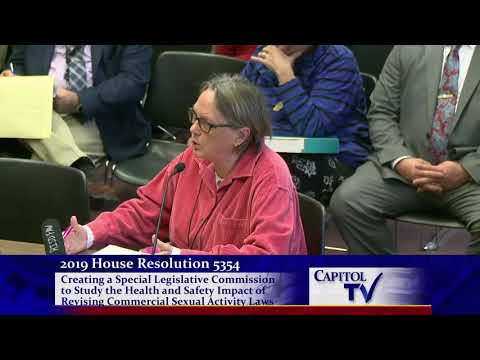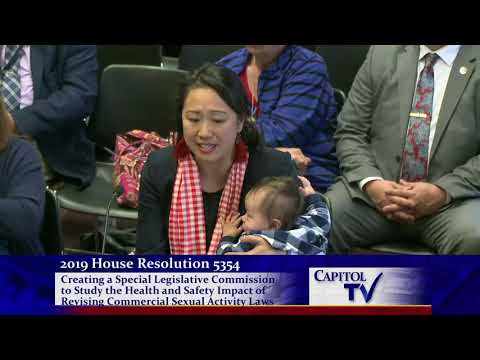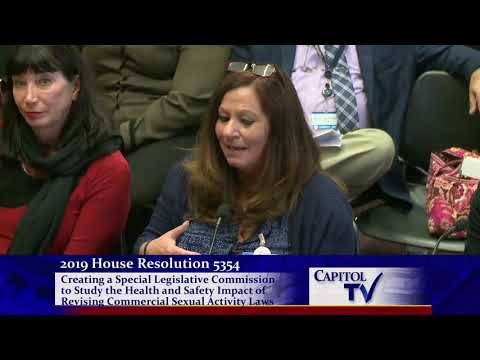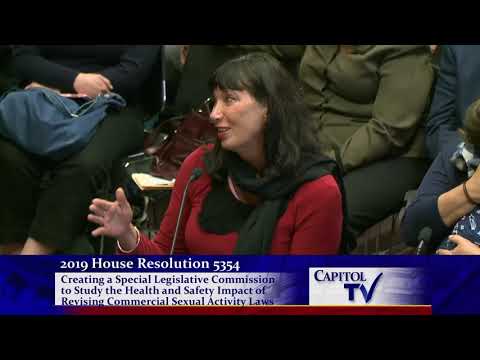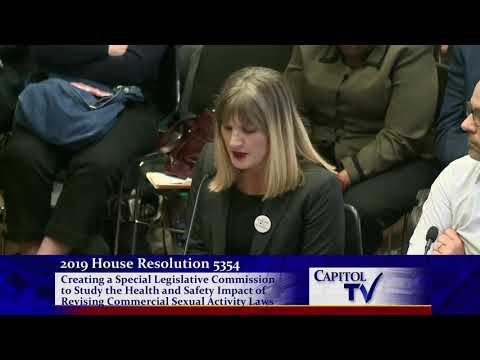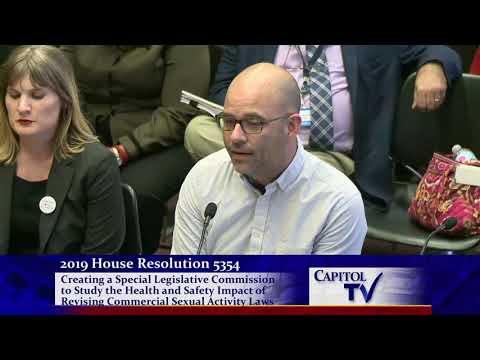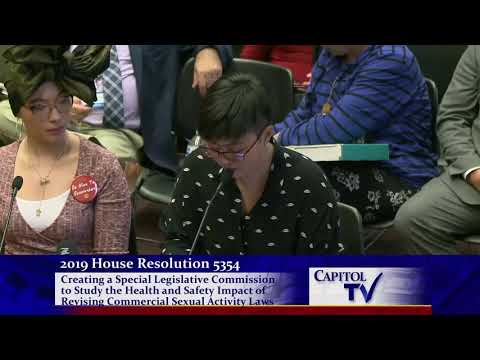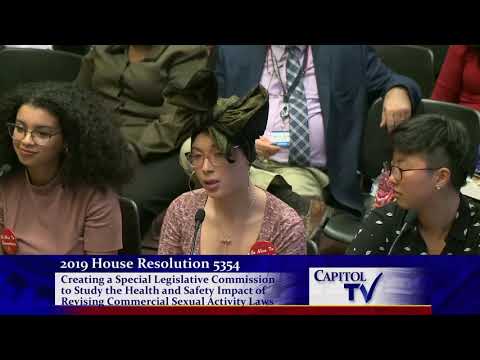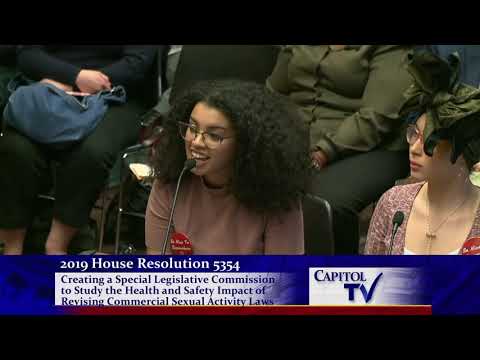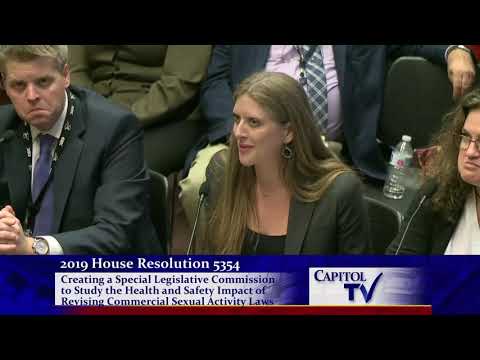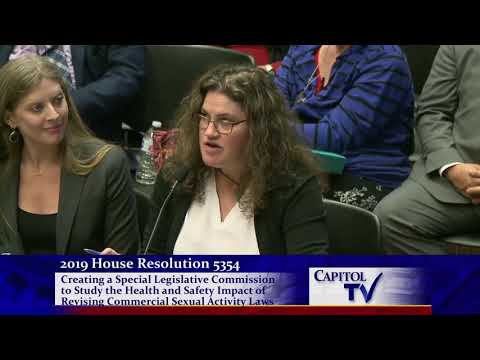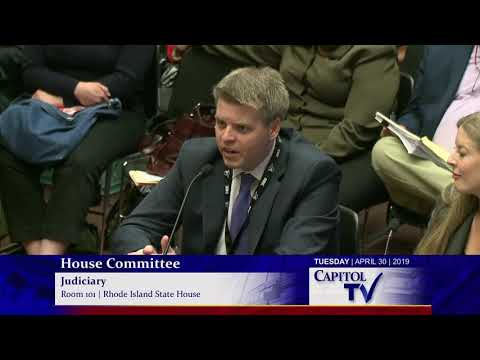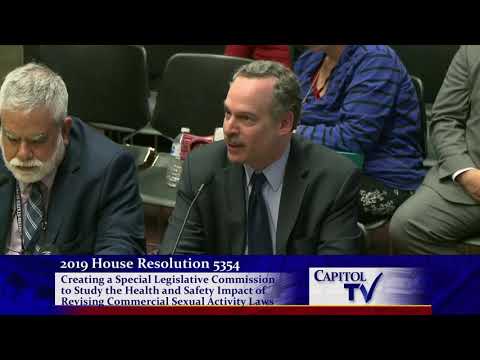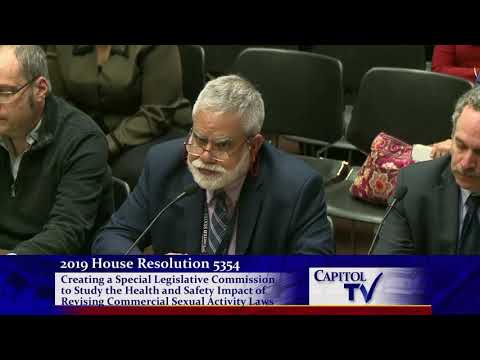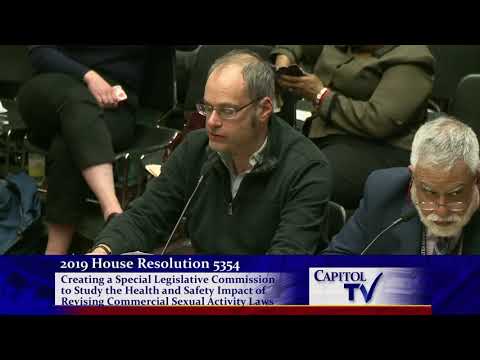Rhode Island House considers creating a study commission to examine laws on sex work
The House Judiciary Committee heard testimony Tuesday evening from 18 people in favor of creating a special House Commission to study the health and safety impact of revising commercial sexual activity laws. In other words, the commission would look into the possibility of restructuring or even decriminalizing the state’s laws on sex work. No one testified against the resolution. All
May 1, 2019, 1:40 pm
By Steve Ahlquist
The House Judiciary Committee heard testimony Tuesday evening from 18 people in favor of creating a special House Commission to study the health and safety impact of revising commercial sexual activity laws. In other words, the commission would look into the possibility of restructuring or even decriminalizing the state’s laws on sex work. No one testified against the resolution.
All the testimony is presented below.
“This is something for conversation,” said Representative Anastasia Williams (Democrat, District 9, Providence), introducing her bill, H5354. “This is a topic that needs to be discussed, needs to be talked about – grown folks conversation – and for some grown folks it’s a squirmy-ish topic.
Sex. Now, we all like it. I know there’s no ifs, ands or buts about it. But I don’t think there are enough of us bold enough, open enough, to talk about it – openly talk about it – have a grown folks conversation about these topics.
Sensing an uphill battle in convincing her fellow lawmakers that the study commission is needed, Representative Williams appealed to her colleagues to open up their minds.
“I’m asking you to please, don’t only listen to me and others that are here to present the information very important information,” said Williams, “but I’m asking you to hear what is being said. Many times we tentatively sit down and give a little smile and make believe but I’m asking you respectfully today to hear what is being presented to you.”
“I have represented well over a thousand people who have been arrested for prostitution offenses in New York City. I’m very familiar with how the policing of the commercial sex industry impacts people arrested for prostitution, offenses profiled as being involved in prostitution and survivors of human trafficking who are arrested,” said Kate Mogulescu, a professor at Brooklyn Law School in New York and the lead attorney for the American Bar Association’s Survivor Re-Entry Project.
“I think the national landscape has really shifted on that and what we are seeing across the country is a real interest and need in examining our laws that govern the commercial sex industry because there is such overlap with issues of sexual violence human trafficking, exploitation, and also marginalization of the communities that Representative Williams discussed. People of color, transgender individuals, people who have existed in poverty and are living in cycles of poverty – the very people that in so many other capacities in all the work that we do we are trying to support and assist…”
Julian Modzeleski, described her work defending people taken before New York’s Human Trafficking Intervention Court. Though she has seen positive outcomes for some of the people brought before these special courts, they don’t address major issues facing sex workers and victims of sex trafficking.
“Some of the issues that they don’t address is the discriminatory policing practices by police departments who are arresting mostly black and brown women, trans women and cisgendered women and bringing them into the criminal justice system,” said Modzeleski. “They do not address oftentimes harmful and violent behavior exhibited by police during the arrests of sex workers. The also don’t address the devastating consequences and arrest has on a non-US citizen and their immigration status. Finally, these courts don’t address services these women actually need. The actual needs of these women include safe housing, immediate housing and job opportunities.”
Mogulescu and Modzeleski answered questions from Representatives Joseph Almeida (Democrat, District 12, Providence), David Place (Republican, District 47, Burrillville, Glocester) and Blake Filippi (Republican, District 36, Charlestown, New Shoreham, South Kingstown, Westerly).
“It is important,” said Gail Harvey from Rhode Island NOW. “This is democracy at work. You’re not going to make sex go away – women and people of color – it’s always here and it always will be. How do we want to handle it and how do we want to handle it as far as the law is concerned? How are we going to handle it when we have health care people who understand what’s going on? How are we going to handle it when we have women who are brave enough as sex workers to come forward and talk to you about it? How in good conscience can we as citizens turn our turn away from this and say. ‘No, no it’s too difficult’?
“It’s way too difficult to ignore it…”
Brown University‘s Elena Shih is considered a global expert on migration, sex trafficking, labor trafficking and sex work.
“I want to tell you an entertaining story,” said Shih. “About a month ago Cindy McCain was traveling through Phoenix’s Sky Harbor Airport and she believed she witnessed an act of human trafficking and quickly notified law enforcement who detained the passengers in question. Recalling the events on a radio show McCain said, ‘I spotted it looked odd – a woman of a different ethnicity than her child, this little toddler she had. Something didn’t click with me. I tell people to trust their gut. I went over to the police and told them what I thought. They went over and question her and by god she was trafficking that kid.”
“McCain further tweeted about this incident to widespread acclaim espousing a new belief in civilian vigilance to stop sex trafficking and throughout the country and in our state publicly funded human trafficking awareness trainings embolden everyday people like you and me to call the police when they believe they’ve seen a sex trafficking crime.
“Right here in Providence, Rhode Island, a 2016 crackdown on Asian massage parlors was widely touted in the news media as rescuing victims of sex trafficking. But in our research we learned that not a single worker was offered an amnesty visa for victims of trafficking and instead most, who were undocumented Korean workers, were deported.
“So much of the fight to stop sex trafficking is morally as opposed to empirically guided work. Rather than ask the people who are directly affected by and engaged with the sex trade, what they think and what might help them, policing prostitution satisfies the emotional needs of the people doing the rescuing.
“That brings me back to Cindy McCain. After police investigated the so-called case of trafficking that McCain had reported they discovered it was not sex trafficking at all but rather just a mixed-race family traveling together. This blatant act of racial profiling in the name of identifying and rescuing a victim of sex trafficking has really become endemic to the policing of prostitution.
“We stand before you with the audacity to advocate for what sex workers want because we have actually asked them in 2015. The American Sociological Association awarded a community action research initiative grant of $3,000 to Bella Robinson and myself. The funding supported a research study to understand the effects of policing for sex workers in Rhode Island…”
“I had my first prostitution arrest when I was 18 years old,” said Bella Robinson, executive director of COYOTE RI. “It pretty much sealed my fate into the sex industry. Even though they withheld the adjudication and this is pre-Internet, it’s really easy to find out this information by public records searches. Nowadays policing with the splattering of names and photos all over the Internet, it really doesn’t matter if you get that arrest vacated later because anyone that hires you can Google it and find out.
“Before I close I want to tell you about my last arrest in New Jersey ten years ago. I was 44 years old. I was working with another woman, that’s also 44. If two sex workers work together they can be charged with felony pandering and promoting. You can understand why they would be safer that there’s two or three women working together but the laws around it are made to make our lives more dangerous…
“So we’re 44 years old and a SWAT team kicked in my door of my home with the RAM, without a warrant, waving guns. I felt like I was a terrorist and the military was coming in. I was jailed for 90 days. The judge made me pay a $3720 fine and when I told him I had a 17 year old daughter and had lost my house in the recession he did the math and said, ‘You’re gonna pay $310 a month for 12 months or I’m gonna issue the warrant.’ So I was basically trafficked by the State of New Jersey’s courts.
“The best way to find out if someone is being exploited or harmed or taken advantage of is not to ask the lawyers, not to ask the police, it is to ask them [about] their experiences.”
Dame Catherine Healy is a New Zealand sex workers’ rights activist, field researcher and former prostitute working for decriminalisation of prostitution and generally for the improvement of the sex work profession. She is the national coordinator and a founding member of the New Zealand Prostitutes’ Collective.
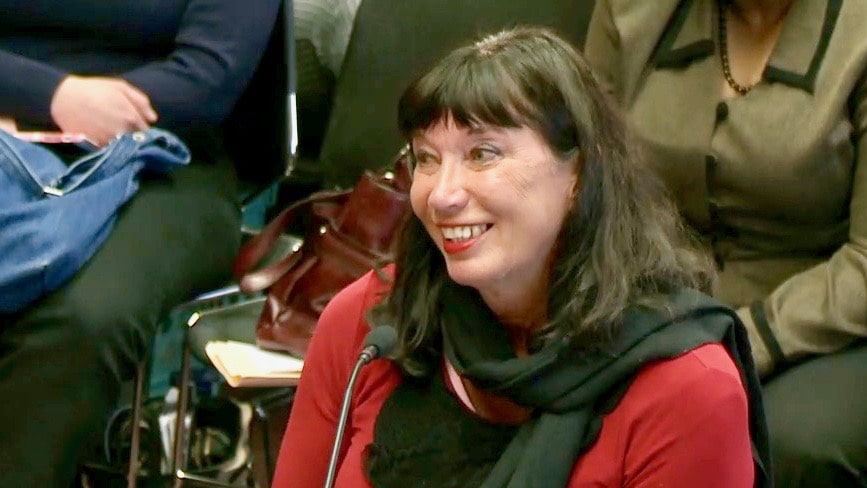
“I flew from New Zealand and of course you know that we cross a Dateline but I had to fly back into the past,” said Healy. “It’s interesting. It’s May Day in New Zealand… I want to reflect on a personal experience because before the Queen made me a Dame I had been a sex worker for a number of years and it was on May Day that I was also released from a court on a soliciting charge for sex work-related activities.
“My role in New Zealand has been to lead on the sex worker issue and to take the contract with the Ministry of Health which we’ve sustained for 30 odd years to lead the response to important issues related to HIV prevention, sexual and reproductive health rights and so on as well as now, in a post decriminalized situation.
“New Zealand decriminalized sex work in 2003. We take the responsibility to ensure that sex workers have a relationship with government agencies etc. We broker a lot of relationships there with our contract with the Ministry of Health – they resource us.
“I have to say I can reflect on 17 years of criminalization and 17 years of decriminalization and we have a lot of evidence that we’ve gathered out of both of these different contexts. If you have a study commission… you will gather all that evidence as well and it will deliver some kind of situation you can reflect on and project into your future response to sex workers.
“We set up a committee after decriminalization to review the impact of the legislation on the occupational safety and health and the rights of sex workers and on that committee we had a chair who had been a police commissioner, we had a Catholic nun, we had three representatives who were sex workers… You get the picture, it was eclectic.
“The opinions were diverse. We had people who had opposed decriminalization of sex work as well. As a committee it had to come to some kind of consensus and deliver a report back into the Parliament. The consensus at the end of that time was that they wouldn’t roll back the clock. The recommendation was to keep decriminalization. However, you know political waves come and go and there was a petition from people who were unhappy with decriminalization so there was another select committee that examined the issue again in the context of understanding the Swedish model…
“The Select Committee on that occasion examined very carefully what the Swedes had recommended, prosecution of clients, criminalization, that kind of model, and rejected it.
“The point I’m trying to make is that there’s nothing scary about examining it, having committees to look at these very tense issues, to bring in all the different kinds of points of view. I strongly support this recommendation and I hope that you have a successful outcome from it.
“Thank you for allowing me, someone who comes from the future, to speak.”
“I’ve been working in outreach to people involved in the sex trade for over five years. I’ve worked previously as a harm reduction specialist, a certified HIV tester and counselor,” said Brown University student Meghan Peterson. “I currently coordinate a street based sex worker led outreach program here in South Providence so I have spent a lot of time working with this population.
“Criminalization of sex work affects human health and prosperity by exposing people to the criminal justice system. At COYOTE, we outreach people who were involved in the sex trade and are at high risk for arrest. Many of our community members have described how experiencing an arrest impeded their social mobility. Some have discussed how having a criminal record made it difficult to find employment or housing. Even in Rhode Island where we have so-called Ban the Box legislation which prohibits asking about criminal history on job applications, having one’s legal name attached to a newspaper article or a police log detailing a prostitution raid can sink a jobs application after a quick Google search.
“I wanted to talk about a recent community survey that we did where one participant stated about her job history, ‘I think my past prostitution conviction would stop me from landing a good job. This is one of the reasons I have not bothered going to college and getting my degree because the world will see me as a whore so why bother?’
“Others in our community have discussed how arrests caused them to be alienated by their peers, co-workers and neighbors. One client recently discussed how, after her photograph was shared by local news outlets, she received threatening text messages. Some of these were from a former romantic partner from whom she feared bodily harm.
“Many of our community members have discussed with us personal stories of how their involvement in the criminalized sex trade led to discrimination and subsequently de-prioritization of health. For example, another participant in the survey talked about having stayed in a domestic violence shelter after being abused by her boyfriend. She said, ‘I was treated okay at the domestic shelter until someone found out I was a sex worker. I was treated horribly after that and I was told that I should try going to another shelter because they claimed me being there was upsetting the other women. I was not kicked out but after a few days of listening to hateful gossip I thought going back to my abusive boyfriend might be better than staying where I was not wanted.’
“When stigma creates living conditions that are so unbearable for people that they would rather stay with an abusive partner than seek protection, our laws are actively harming women and their livelihood.”
“My background is economics and I’m considered an expert on the economics of sex work. I want to share with you a little bit about two studies of mine that I think are relevant to this topic,” said Scott Cunningham, professor of economics at Baylor University in Waco, Texas.
“In 2003 there was a judicial decision in Rhode Island that effectively constrained police arrests of sexual indoor sex workers and what me and my co-author Manisha Shah found was that after that decriminalization, reported rapes of females fell 30 percent and gonorrhea incidence amongst women fell 40 percent.
“Now, we’re not entirely sure exactly what’s going on with the rape results. We suspect that this is decreased rapes of all women. What we think is going on with the effect on gonorrhea is that that decriminalization led to safer behaviors amongst the sex workers, particularly the indoor sex workers.
“I want to tell you about another study that of mine that I think is still relevant and it concerns the rollout of an online platform called Craigslist Erotic Services that entered cities at different points in time from 2002 in 2009.What we found is that when Craigslist opened its erotic services in those cities female homicide rates fell 10 percent. We find no effect on male homicides, we find no effect on domestic violence, we find no effect on manslaughters. This is just reductions in female homicides.
“The best that we can tell is that it’s leading women sex workers to move off the streets and go indoors where they have the ability to screen clients beforehand and eliminate some of the violence that they face under criminalization.”
Brown University sociology student Yeonhoo Cho supports the resolution to form a sex work study commission, “in solidarity with sex workers, particularly the 13 Korean female sex workers who got arrested last month in Pawtucket.
“For the past year I would drive across the entirety of Rhode Island to visit Asian spas and massage parlors with an aim to build relationships with the Asian migrant sex workers and to communicate about the resource that they might need.
“When I visited the Asian massage parlors, including the ones in Pawtucuket that got raided last month, I did not see any signs of trafficking. My observation is in stark contrast to the recent media coverage about the police raids and arrests, where these women are seen as either sex trafficking victims or sex trafficking pimps and nothing in between.
“When I spoke to the women working in the spas they seemed concerned about being found out not just by the police but by non-governmental service providers like myself because of the active criminalization and stigmatization that they face.
“It is unfortunate that the Pawtucket police raids on the spas completely nullified and undermined our outreach efforts.”
When they police say they are protecting the neighborhood, said Cho, “we need to pay close attention to who they see as neighbors who deserve protection from whom?”
“I can see a trend in sex worker written zines,” said Brown University student Malana Krongelb. “These are the voices of people [impacted by] increased violence especially after the federal FOSTA/SESTA bill. There’s fear. There is a call for decriminalization and there is a sense of hopelessness about legislators not listening to people. That’s now the narrative that’s being archived.
“I want a different narrative… I want my children to look back on things and say, ‘Oh, this is the positive things that we have done. Look at the changes that we have,’ because I don’t want it to be all pain. It’s really harrowing to read all these stories and see that there’s often easy fixes – but so many people are not getting listened to.”
“I interned at Polaris and subsequently wrote my senior thesis on their Latina sex trafficking initiative,” said Brown University student Dayana Tavarez. “Through this process: I engaged in ethnographic research through attending human trafficking trainings hosted by nonprofit organizations here in Rhode Island as well as interviews with undocumented migrant sex workers. Through my research process I gleaned that there was inherent racial bias in the policing of these migrant sex workers and a critical lack in research and fundamental understanding of trafficking on the part of these nonprofit organizations.”
“I’m an attorney and a longtime activist and advocate for all people in the sex industry, whether there by choice, circumstance or coercion,” said Melissa Broudo from the SOAR Institute. “I’ve done direct representation of survivors of human trafficking and I’ve also done policy work. That actually began while I was an undergrad at Brown almost 20 years ago so it was particularly exciting to see this new crop of students…”
“I’ve been researching prostitution, sex work and trafficking in the sex industry for the past 15 years,” said Dr Jill McCracken from the University of South Florida. “I began this research to better understand how we can reduce violence and exploitation in the industry. That was my primary goal. If this commission is approved we can collate and enhance our evidence-based research.
“Prostitution is currently pushed into the shadows. It actually creates the conditions where tremendous abuse, exploitation and violence can occur and that’s what we want to learn more about in the study. Within the United States specifically we know very little about how alternative legislative systems might work in relationship to prostitution.
“During the fall of 2018 I was thrilled and very excited to spend three months in New Zealand on a Fulbright specialist grant. My goal there was to look at a legislative system and to better understand its impact on violence and trafficking in the sex industry.
“I’m only going to note one finding in particular: None of the sex workers I spoke with had experienced any violence at the hands of police. That was astonishing to me…”
“We are supportive of this resolution and the study commission that it would create,” said attorney Ryan Holt, representing the Rhode Island Attorney General’s Office. “We think it’s important to have an evidence-based approach to lawmaking, hear from stakeholders, hear from others and that this issue is is worth taking a closer look at.”
“I am one of the few people who was here ten years ago to testify against the law that was passed in 2009 that expanded the prostitution laws,” said Steven Brown of the Rhode Island ACLU. “Back then and before then, we have long advocated for the decriminalization of consensual sexual activity.
“I recall the arguments that were given for passing the 2009 law, expanding the statute, was that it was designed to protect women. That it was designed to crack down on human trafficking. And if we have learned anything in these last ten years – it has not done that.
“We obtained the records of all prostitution related arrests for the past three years. In Providence, 94 percent of those arrests were of women. In Woonsocket 89 percent of those arrests were for women. This is supposedly based on a law, that was passed in 2009, to protect women…”
“We think that when organizations and people of goodwill are brought to the table that extraordinary things can and are accomplished,” said Michael DiLauro from the Rhode Island Public Defender’s Office in support of the resolution.
“I think it’s good to take another look at the laws and see if we can find a way to deal with these very serious problems that are affecting the lower-income people who go into the sex work industry,” said Randall Rose. “One of the very good things about this bill is it’s focused on hearing from those who are affected, hearing from the sex workers and giving them a voice in drafting the bill…”
Uprise RI is entirely supported by donations and advertising. Every little bit helps:
Become a Patron!



